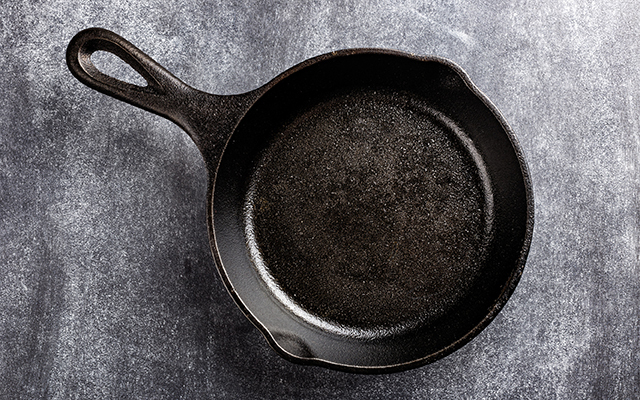Meetings at the Experience Life office can be lively. We’re passionate about the topics we cover — health and nutrition, emotional well-being and relationships, fitness and movement — and friendly debates and hearty discussions arise often. But when it came to the subject of cast-iron cookware last week, things got a bit heated.
It all started when our associate editor presented her rough draft of a short article about how to care for a cast-iron skillet. Who would have guessed that this question would touch a collective nerve? Opinions were strong, and our meeting was sidetracked for at least five minutes of question asking and advice giving, laughing and gesticulating, and tales of rusty frying pans rescued from the brink. Firm rules about cast-iron care were established and agreed upon.
Then I shared a dark family secret: My husband not only uses dish soap to wash our cast-iron pots and skillets, but he frequently soaks them in soapy water overnight! The shock at this offense was palpable. At home, the question of how to clean and maintain our collection of cast iron — which, I should note, has survived several generations in my husband’s family — has been the catalyst of more bickering and passive-aggressive behavior than either of us cares to admit.
Him: Why can’t she just relax about the cast iron already?
Me: Why can’t he just do it the right way?
Ay, There’s the Rub
I do have a bit of a thing about doing things the “right way.” I chalk it up to being a first-born with a lifetime of behavioral reinforcement supporting this impulse. Or neurosis, whatever. I don’t think it’s just me, though. Who doesn’t like to be right? Who doesn’t strive, consciously or not, to arrive at some hard-and-fast conclusions about life? There’s so much uncertainty in this world — with its constant change and all its contradictions and paradoxes — that it seems perfectly reasonable to try to pin a few things down.
But it’s a slippery slope, this quest for certainty. One day you’re certain about the cast iron, and the next day you’ve arrived at the steadfast conclusion that your neighbor is a jerk — and you won’t be swayed otherwise. And don’t even get started on healthcare legislation. Families break up over certainty. Countries go to war over it.
Fortunately, there are wise people out there who can help free us from the perils of being right all the time. For me, one such person is a Buddhist teacher named Elizabeth Mattis-Namgyel, whose book, The Power of an Open Question, examines our tendency to seek certitude.
“Think of how many conclusions we reach each day,” she writes. “Think about all of our likes and dislikes, our views about the world, who we think we are, and who we decide we want to be.” She explains how, before we arrive at a conclusion about a given situation, we first objectify it. Take that jerk-neighbor who never speaks to you other than to complain when your dog gets loose in her yard. In the filing cabinet of your mind, you might categorize her under Cranky Lady Who Doesn’t Like Dogs. You can see how this could become problematic.
“When we objectify something, we draw a boundary around it and therefore only know it in a limited way,” Mattis-Namgyel explains. You don’t know about your neighbor’s traumatic experience with a dog when she was a girl. You don’t know that she feels lonely sometimes, or that she’s a great pie-baker, or that her greatest joy is tutoring kids with learning disabilities.
Instead of maintaining mental files of good and bad, right and wrong, Mattis-Namgyel advocates developing a mindset that leaves life’s questions open.
“Think of what happens when we ask a question,” she writes. “Curiosity and wonder keep our mind in suspense, and we engage our experience without objectifying it. Our mind stays wide open, alert, and ready for possibility. We may even say we have reached the height of our intelligence when we ask a question.”
Which of course raises this question: Would I rather be right, or would I rather reach the height of my intelligence? Life offers limitless opportunities for me to practice staying open, alert, and ready for possibility, as Mattis-Namgyel advises. I could certainly apply the “power of an open question” to my hard-won conclusions about virtually anything — politics, religion, Oscar-worthy movies. But tonight, I guess I’ll give it a try by letting my husband wash the cast iron his way.

This Post Has 0 Comments